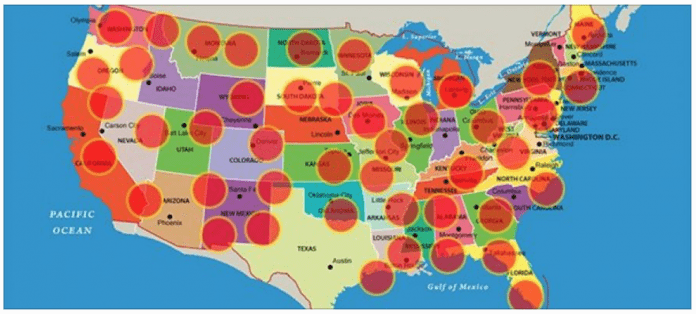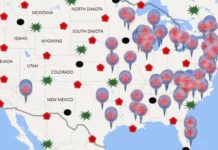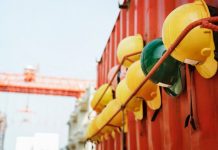The world is facing the biggest catastrophe it has faced since World War II. As the Coronavirus spreads around the globe, governments and medical personnel are scrambling to figure out what to do. This unprecedented disaster is creating a lot of unrest on Wall Street, causing some serious losses in the stock market.
On top of that, we’re seeing the first real global petroleum war as Russia and Saudi Arabia battle it out over crude oil prices. This is having a major impact on American oil companies, with wellhead prices on crude oil now lower than what it costs for those companies to produce their product. If this continues for any great length of time, we’re going to see a large number of oil companies shutter their doors; starting with the small ones and perhaps including some of the biggest players in the field.
All this unrest and the country’s reaction to the virus appears to have brought to an end the growth we’ve seen in our economy over the last three years. Some economic gurus are claiming that we will see unemployment as high as 20% in the next few months. Others are speculating about a worldwide recession or depression because of COVID-19.
It’s strange, but whichever president is in office usually gets the credit if our economy is strong, as well as the blame if it is struggling, even though he really doesn’t have control over it. There are many factors which work together to create a strong economy. If any of them are missing, it could have a downward effect.
So, while the president gets the credit or the blame, much of it should be laid at the feet of the nation’s bankers and brokers, especially those on Wall Street. They are the ones who keep the economy ticking, all the president can do is create an atmosphere that’s conducive to it ticking well. But if the big bankers see a benefit to themselves or their companies in letting the economy tank, they’ve got the power to make it happen.
That’s the scary part. While it mostly falls into the realm of conspiracy theory, there is evidence to show that previous economic downturns and even wars have been started for no other purpose than to give these ultra-wealthy movers and shakers an opportunity to make money. Of course, the same evidence can show that they were merely being opportunistic, taking advantage of the opportunity presented to them. It’s all a matter of the way you look at the evidence.
Regardless of which is true, I’ve seen a steady stream of reports about how the economy is going to take a turn for the worst, ever since we caught our breath after the Great Recession in 2008/2009. Whether those reports are nothing more than fear mongering or based in reality is something to be seen. But the sheer quantity of those reports leaves me feeling a bit uncomfortable.
Even if none of those reports are true, there are still things that could cause the world’s economy, not just the US economy, to suffer a major hiccup. Chief amongst them at this time is the coronavirus, which is already affecting the shipment of products out of China. Since just about every product manufactured in the world uses parts from China, in addition to all the products manufactured there, this is bound to create shortages and affect the world’s economy. The only question is, how much?
With that in mind, it might be a good idea to have some idea of where to go, should our economy take a major hit and we end up in another recession.
Texas
If there was a contest over which state fared the best in the Great Recession, Texas would be the clear winner. The Lone Star state was the least affected by the recession and recovered from it the fastest. Some parts of the state, like McAllen, one of the fastest growing areas in the country, still had respectable new home construction figures, while the rest of the nation’s construction workers sat at home, waiting for things to get better.
Those in the know (mostly businessmen and politicians) like to brag that Texas has the 15th largest economy in the world. That’s compared to nations, not just other states. The state’s diversified economy is more insulated from economic fluctuation that hits only one sector. Besides that, there is plenty of land available for living off grid, with less regulation than many other states.
The Dakotas
One wouldn’t expect it, but the Dakotas, especially North Dakota are amongst the nation’s best financial performers in many categories. That extends out to include the rest of the Northern Midwestern states as well. Between agriculture and a renewed oil boom, cue to fracking, these states have low unemployment and solid state government finances, mostly operating with fiscal surpluses.
Nebraska, a close neighbor, has the most diverse economy in the country, with its’ top industries accounting for only 4.97% of the state’s GDP. That keeps Nebraska from suffering economic fluctuations in specific industries, just like Texas.
This part of the country is attractive as a bug out location due to low population densities and large amount of agriculture. If you need someplace to go when everything goes south, it’s hard to beat the Midwest.
Arkansas
I wonder if Arkansas’ reputation as s hick state is a bit of propaganda on the part of their government. People tend to overlook just how attractive a location Arkansas is to live in, either due to that reputation or because there is no one thing that makes the state stand out.
Nevertheless, Arkansas has a very stable economy, with the average household income in the state’s capital being dramatically higher than it is in other states. Yet the cost of living, which is largely driven by housing costs is low and the relative value of the dollar (its buying power) is one of the highest in the nation. All this together means that it will be one of the cheaper states to be in, when and if the economy takes a turn for the worst.
The Nation’s Breadbasket
When we talk about the Nation’s Breadbasket, we’re talking about a whole bunch of states, from Kansas to Ohio and from Missouri to Minnesota. These, and a few others, are the major farming states of our country, producing the majority of the grain we consume, as well as grain that is shipped to countries around the globe.
Perhaps it’s the natural conservatism of farmers, who really only make up a small percentage of these states, but the states that comprise the Breadbasket tend to be steady performers economically, coming in high in any study done of the several states economies. While they might not have the high tech flash of California or walk hard heeled down the walkway like Texas ranchers and oil men, the people of these states definitely do their part to keep the nation on an even keel.
West Virginia, Kentucky and Tennessee
Once again, I’m lumping states together geographically. That’s because these states share some regional attributes, which make them a good choice to live in; both economically and otherwise. But these states share something else which makes them of interest to us; that is they are excellent bug out locations, with lots of mountain land that can be used to build a survival retreat. In fact, there are developers in this part of the nation, who specialize in selling land just for that purpose.
All three of these states have very solid financial statistics, just like those in the Nation’s Breadbasket. They’re also looked at as the home of hillbillies and hicks; just like Arkansas. Maybe there’s something there. Those good old boys just seem to know how to keep things on an even keel.
A Final Observation
As I look back over the states which I’ve chosen for this list, one glaring reality sticks out to me. Perhaps you didn’t see it; but I did. Before I tell you what it is, I want to say that this characteristic wasn’t taken into account as a part of my decision. Rather, it could be an explanation of why those states are in such good shape, financially speaking.
What I’m referring to is that just about every one of those states is a Republican controlled state, with conservative fiscal policy. There are a few exceptions in the Breadbasket; but other than that, they are all states with a long history of voting red and calling for financial accountability from our government. Considering some of the things that California and New York state governments spend money on and some of the laws they enact which restrict business, it’s no wonder that those states suffer the worst, whenever there’s a downturn in our economy.




















